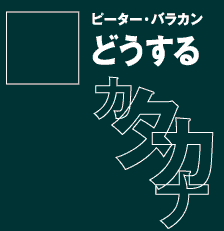

space
space
space
この文章は、講談社+α文庫刊のピーター・バラカン著「ぼくが愛するロック名盤240」まえがきの中の『読者のみなさまへのお断り』より転載しました。英語版はピーター・バラカンさんが葉っぱの坑夫のために書きおろしてくださったものです。
この文章は、講談社+α文庫刊のピーター・バラカン著「ぼくが愛するロック名盤240」まえがきの中の『読者のみなさまへのお断り』より転載しました。英語版はピーター・バラカンさんが葉っぱの坑夫のために書きおろしてくださったものです。
イギリスでは自分のことを笑えることが大変重要で、逆に自分のことを笑えないやつは野暮といった雰囲気がある。英語でself-deprecating(セルフ・デプレケイティング)という、ぼくはそんな感覚を日本語で表現する時は"自嘲的なユーモア"と言っているが、この"嘲(あざけ)る"という漢字が持つニュアンスがよくないとの指摘をうけたことがある。
たしかにdeprecateという単語は、他人に対してなら日本語と同じ意味を持つが、対象が自分自身となるとむしろ肯定的な印象を与える。これはイギリスと日本の文化そのものの違いかもしれない。
長年東京で暮らしているにもかかわらず、自分自身の笑いの感覚はやはりイギリス的だなと、改めて感じた。そんなことを念頭におきながらお読みいただけると幸いです。
それから、選んでいる作品の表記について、日本語のアルバム・タイトルや曲名をどうするか、著者と編集者の間で相当の議論が展開された。原稿を書いた時点でどのアルバムもCDで入手できることを条件に選んでいるが、国内盤で簡単に買えるものもあれば、輸入盤しかなく、しかもかなり探しにくいものもあるわけだ。
しかし、本が出たあとに初めて日本盤が出たり、あるいは逆に日本盤が廃盤になったり、状況がいつどう変わるか分からないので、そういう区別を一切せずに表記することにした。邦題がつけられたことがあるアルバムや曲名は、ぼくの反対意見が押し切られて、その邦題で表記された。その代わり、巻末に、付録のような形で英語の原タイトルもすべて掲載したので、参照していただきたい。
また、この本に登場するミュージシャンや作品の名前はすべて外国のものだ。これらの名前をカタカナで表記するにあたって、ぼくは大きな悩みを抱えた。それは、日本で通常使われている表記が間違っている場合が多いからだ。残念なことに、レコード会社は間違いに気づいても「もうこれで通っているから」と、たいてい直そうとはしない。
しかし、人の名前を正しく発音しようと努力することは、その人に対する最低の礼儀だとぼくは考えている。したがって、この本では人名の表記は原語にできるだけ近いものにしている。見慣れないものもかなりあると思いますが、ご了承ください。
もし、徹底的にやれば、たとえば「ロバートソン」は「ロブツン」に変わってしまうので、ある程度は日本の習慣を尊重したが、「アレサ」を「アリーサ」に直したり、存在しない「グラハム」を「グレアム」に直したりはした。ちなみに、「アコースティック」というのも「アクースティック」でなければならない。「ブルース」も「ブルーズ」だ。
どの辞書を見ても正しい発音がちゃんと書いてあるにもかかわらず、日本の音楽業界は間違ったつづりを使い続けており、ぼくが「朝日新聞」に書く原稿も、本人が説明しているのに改められるほどだ。
もう一つ、ぼくはこの本のタイトルを「マイ・ジェネレーション」(もちろんザ・フーの曲名にちなんで)にしたかった。それは、ここで書いている内容を最もうまく表現したものだと思っていたからだ。自分が長い月日をかけて書いた本だから、それが世間でどのように呼ばれるかについて当然かなりのこだわりがあるが、残念ながら実現しなかった。愚痴のように聞こえるかもしれないが、読者の皆さんに自分の気持ちを知って欲しい。
1998年9月
Copyright 1998 by Peter Barakan
space
space
space

An extract from the preface of a book by Peter Barakan, written in Japanese, published under the title "Boku ga aisuru rock meiban 240,"and translated into English by the author.
In Britain being able to laugh at yourself is extremely important, and someone who is incapable of doing this tends to be seen as a 'nerd.' However, the phrase 'self-deprecating,' though in daily use in Britain, is almost unknown in Japan, and the associations are quite different, with the result that I have been advised on several occasions not to use the word. Admittedly when applied to others the word 'deprecate' does have negative connotations, but when the object of the scorn is oneself the nuance becomes a positive one to an English speaker, at any rate if the speaker is British. Many years of living in Tokyo have made me increasingly aware of the cultural differences between Britain and Japan, and also of the fact that my own sense of humour is immutably British. It will probably benefit both writer and reader if you bear that in mind as you read this book.
One other thing I wanted to make mention of was the manner in which English record and song titles have been rendered in Japanese. This matter was the subject of some debate between myself and the editors of the book. The only criterion for inclusion was that the album in question be currently available in CD form, whether it be a Japanese domestic release or in some cases an import which might present a serious challenge to obtain. The problem is of course that a certain record might be released domestically for the first time only after publication of the book, or there might be changes in distribution at any time. We therefore opted not to differentiate between local and foreign releases. With regard to translated Japanese titles, my opposition to their inclusion was defeated, with the provision that we include a separate English index of titles at the back of the book. I hope this will be useful.
The names of all the musicians mentioned in the course of the book come from countries outside Japan, and their phonetic representation in Japanese was the biggest headache of all. The reason for this is that the generally used pronunciation is in many cases wrong; not only that, but the record companies involved often disregard advice to correct mistakes, on the grounds that the mistakes are already broadly accepted as the correct pronunciation of the name. My own feeling is that the effort to pronounce somone's name correctly is a non-negotiable sign of basic respect for that person, and I have therefore rendered all names as closely as possible to the original, which may lead to some confusion in the reader's mind. Please bear with me on this. Of course there are limits. For example the name 'Robertson' should be pronounced 'Ro-bu-tsun' rather than 'Ro-baa-to-son,' but I have decided to go along with Japanese convention in this kind of case. However, I have changed 'A-re-sa' to 'A-rii-sa' (Aretha) and the nonexistent 'Gu-ra-ha-mu' to 'Gu-re-a-mu' (Graham). I should also add that the word 'acoustic' is pronounced 'a-kuu-su-tikku,' not 'a-ko-o-su-tikku,' and that 'blues' is'bu-ruu-zu,' not 'bu-ruu-su.' It never ceases to amaze me how these words continue to be persistently mispronounced by the majority of people in the Japanese music industry, despite the existence of innumerable dictionaries which all give the correct pronunciation. Perhaps you may sympathise with my irritation when, over my repeated protestations and explanations, the Asahi newspaper still 'corrects' my pronunciation.
Finally, my idea for the title of this book was 'My Generation,' (with a tip of the hat to The Who, of course.) I felt that this title expressed, to the best of my ability, what I was trying to say in these pages. And having spent many months in the writing of it, I felt that I had a right to determine the name by which my creation should be known. Unfortunately that was not to be. I know this sounds like whingeing, but I would like my feelings on this to be public.
Copyright 1998 by Peter Barakan
space
space

Peter Barakan is a freelance broadcaster who has been resident in Tokyo since 1974. Born in 1951 in London, he holds a B.A.in Japanese from the School of Oriental and African Studies of the University of London. After several years spent in the areas of music copyright and artiste management, he decided to take up broadcasting full time, first in FM radio, and subsequently in television also. He currently co-hosts the Japanese edition of the renowned American news magazine programme "60 Minutes," as well as presenting a broad spectrum of popular music from a global perspective, on his characteristically eclectic radio shows in both English and Japanese.
Read his essay "Taking back a few liberties...."
ピーター・バラカン、1951年8月20日ロンドン生まれ。ロンドン大学日本語学科卒業。1974年、来日、シンコ−・ミュ−ジック国際部に入社し、1980年、同退社。
このころから執筆活動、ラジオ番組への出演などを開始、また1980年から1986年までイエロ−・マジック・オ−ケストラ、後に個々のメンバ−の海外コ−ディネ−ションを担当。1984年、TBS-TV「ザ・ポッパ−ズMTV」という音楽ヴィデオ・クリップ番組の司会を担当、以降3年半続く。1988年、10月からTBS-TV で「CBSドキュメント」(アメリカCBS局制作番組60Minutesを主な素材とする、社会問題を扱ったドキュメンタリ−番組)の司会を担当。現在に至る。
現在「CBSドキュメント」の他, 1996年4月に開局したInter-FMでは、毎週日曜日朝9時〜11時の「バラカン・ビ−ト」、NHK-FMでは、土曜日朝8時〜10時の「ウィ−クェンド・サンシャイン」、また久しぶりにテレビでも音楽番組を開始。スカイパ−フェクTV及び一部のケ−ブル局でも配信されている音楽専門チャンネル、Viewsicで、毎週金曜日深夜24時からの「pbs」で、他ではなかなか観ることが出来ない音楽映像を放送中。(再放送は毎週火曜日朝8時と木曜日深夜2時)。他には朝日新聞で洋楽のレコ−ド紹介、雑誌の English Journalでコラムを連載中。また、新しくできたインタ−ネットの“放送局”music.co.jpでは、「KitchenSink」という週一回の短い番組も一年以上続けた。制作は止まっているが、いまだにアクセスが可能だ。
http://www.music.co.jp/~rod/peterbarakan/japanese/kitchensinkP1j.html
■これまでに出版された著書
- 魂(ソウル)のゆくえ(新潮文庫、残念ながら絶版)
ソウル・ミュ−ジックへの入門 - ミュ−ジック捜査線(新潮文庫)
音楽に関するコラムを集めたもの(何とこれも絶版、怒るぞ!) - Love Songs(求龍堂)
自分の選曲による詞集/写真集 - ジャズ・ロックのおかげです(径書房)
ジャズとロックが接近し合った頃の音楽の紹介(共著) - ぼくが愛するロック名盤240(講談社プラス・アルファ文庫)
子供の頃から90年代前半まで最も愛聴してきたロックのアルバムを簡単に紹介
■これまでに行ったコンピレ−ションCDの企画と監修
- Soul Fingers...And Funky Feet
ハモンド・オルガンをフィ−チャ−したソウル・ジャズ - Funktified...And Grooving Hard
(同上) - I Can't Stand It!!
ス−・レ−ベルのリズム・アンド・ブル−ズ - Crescent City Bounce
ニュ−・オ−リンズのリズム・アンド・ブル−ズ - Have Guitar, Will Travel ...featuring Grant Green
偉大なジャズ・ギタリストの名演集 - Funk Is A Four-Letter Word
70年代のファンキ−なジャズ(以上全部東芝EMI)
- The Good Stuff
個人的に好きな、様々なジャンルのを集めたサンプラ−盤
(ビデオア−ツ・ミュ−ジック) - Whatcha Hear Is Whatcha Get
ソウル・ミュ−ジックの名門レ−ベル、スタックスのヒット集
(Pヴァイン) - My Chess Box
チェス・レ−ベルのR&B名曲集
(ユニヴァ−サル・ビクタ−) - Tricky
バスク地方の名アコ−ディオン奏者ケパ・フンケラのベストもの
(オルタ−ポップ)
◇エッセイ「どうするカタカナ」を読む。


